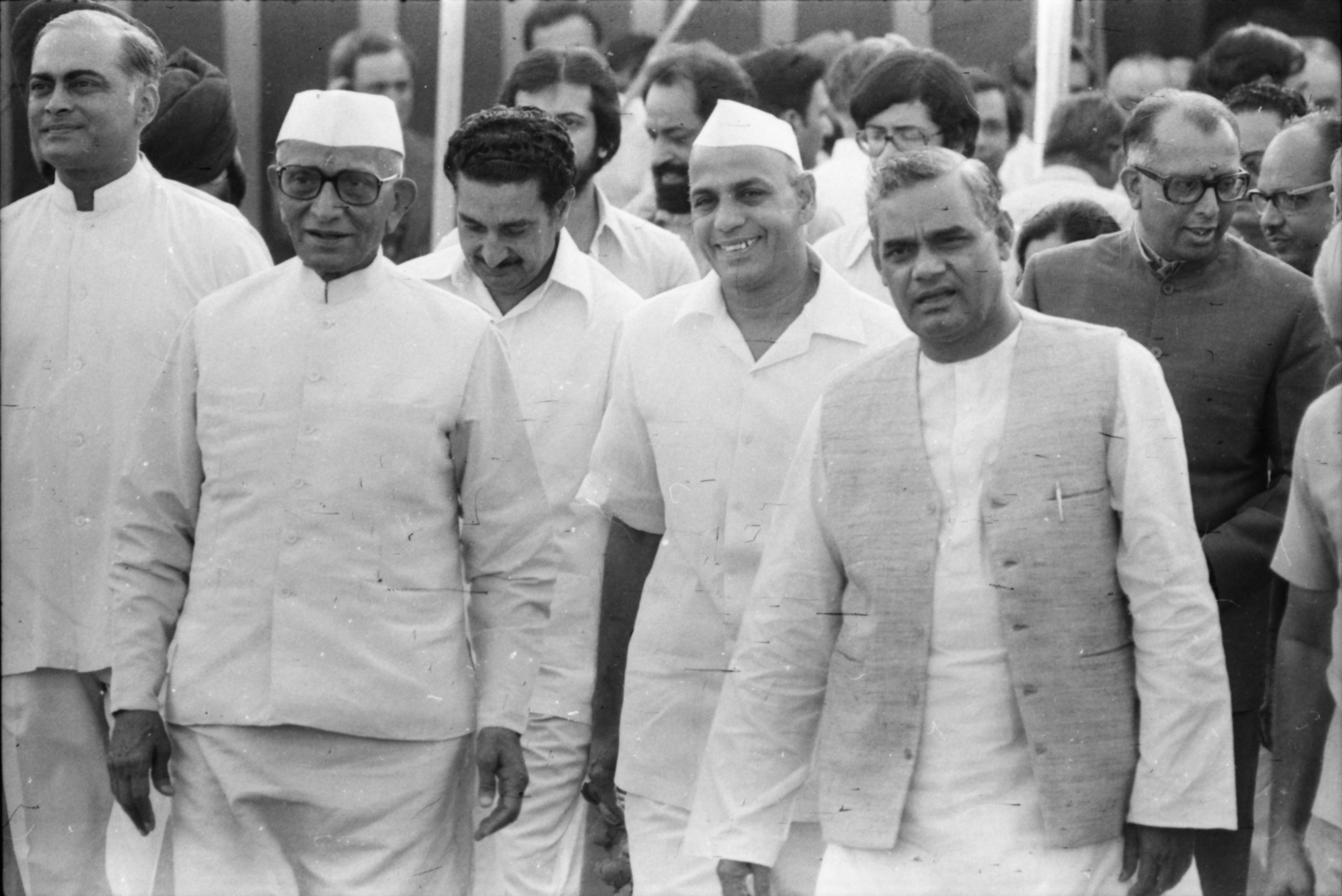
MEN IN POWER: Atal Bihari Vajpayee (right) with the then Prime Minister Morarji Desai (second from left). Vajpayee was elected from the New Delhi constituency. (Getty)
Notwithstanding Janata Party’s unending internal squabbles that led to mid-term election in 1980, Atal Bihari Vajpayee made his presence felt as India’s Minister of External Affairs in the Morarji Desai-led government.
He had established a unique image of himself, especially in the cow belt, by delivering a speech in Hindi at the United Nations General Assembly on October 4, 1977. This was a significant moment as it was the first time Hindi was used on such a global platform.
Following the end of the Emergency, a non-Congress government had come to power for the first time in 1977. However, the Janata Party government collapsed, leading to Chaudhary Charan Singh becoming Prime Minister with the support of Congress in mid-1979. This support was short-lived, and President Neelam Sanjeeva Reddy dissolved the Lok Sabha, paving the way for fresh Lok Sabha elections.
Vajpayee contested the prestigious New Delhi seat on a Janata Party ticket, as the Bharatiya Janata Party (BJP) had not yet been formed then. Political observers were of the view that Vajpayee would be easily elected from the New Delhi seat. He had won from here in 1977 too when he defeated Congress candidate Shashi Bhushan. This time Congress fielded CM Stephen, a relatively unknown figure in the Capital but a prominent leader of the Kerala Congress and a former Leader of the Opposition.
CM Stephen’s Campaign
The tall dhoti-clad Stephen campaigned extensively in New Delhi, connecting with voters through speeches that were translated into Hindi from his native Malayalam there and then. He focussed on the concerns of Central Government employees, a significant voting bloc in New Delhi, and promised to work for their interests.
Stephen was a strong advocate for workers’ rights. Although relatively unknown in New Delhi, he nearly achieved victory against a stalwart like Vajpayee thanks to his impactful campaign and focus on local issues.
According to Congress activist Rajesh Sharma from Minto Road, “I vividly remember Stephen Sahab addressing the problem of rising onion prices, a major concern at the time, and promising to control them if Congress came to power.”
While Vajpayee was initially expected to win comfortably, Stephen’s strong campaign made the election a close contest. Vajpayee ultimately won by a narrow margin of about 5,000 votes, with Stephen even securing victories in certain areas of New Delhi.
Noted Delhi-based journalist AR Wig had once said, “When the RSS realised that Vajpayee might lose, it unleashed a whispering campaign on the day of polling. A Swayamsevak would stand in the queue and say a bit loudly, ‘CM Stephen is a good candidate. But he has one problem. He needs beef even for his breakfast!’ Those who heard him would ask, ‘Oh, he is a beef-eater?’ Needless to say, Stephen lost by a narrow margin!”
Stephen’s impressive performance earned him a Congress ticket for the Gulbarga Lok Sabha by-election in Karnataka, which he won and subsequently became the Minister of Communications.
Vajpayee, after the close call in 1980, shifted his focus away from the New Delhi constituency, contesting from Gwalior and later Lucknow.
In conclusion, the 1980 Lok Sabha election in New Delhi highlighted the unpredictable nature of politics and the importance of connecting with voters at the grassroots level, regardless of language barriers.
Delhi hosted what organisers describe as the world’s first player auction in golf, launching ‘72…
An elderly woman recalls how her six-year-old granddaughter lay bleeding after a speeding car hit…
Municipal Corporation of Delhi plans a unified policy enabling RWAs to adopt and maintain parks…
A 17-year-old boy allegedly died by suicide after jumping before a moving train at Uttam…
Delhi High Court grants bail to 26-year-old Thar driver accused of mowing down two in…
Two Rohini men arrested for fatally stabbing one person and injuring another during a robbery…